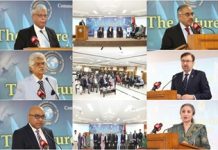It seems that secular nationalism is fast evaporating from the deserts of the Middle East. Along with that, the moderate middle is also shrinking by the day, as sectarian-religious identities take over. It is no longer the same Middle East that modernists had envisioned and wanted to shape using the language of Arab nationalism and revival. A new politics of narrow sectarian and linguistic identities (Iraq) is emerging and it may have deadly consequences for the extended Middle East.
While we look at the current social, religious and political landscape of the region, we need to examine very closely what went wrong and why. This is a subject of many studies and informed reflection, and it has been so for a very long time. In my view, there are two reasons for the failure. One, the fascist route that the post-revolutionary, military-single party alliance took and the political institutions that were structured around the primacy of one ideal, one dream, one leader and one party. That killed the popular aspirations and created kings in uniform and business suits. In practice, they followed Hitler, Mussolini, and in some respects, comrade Joseph Stalin.
Fascism in the world sucked dry every spring of organic thought, fresh ideas and social reflection. It created only official intellectuals, straight-faced flatterers and false messiahs. Society began to rot from the bottom-up. The story of societies where freedom and free thought have been strangulated to give free time and freedom to enjoy absolute power is not different from the Middle East. The Islamists, through charity work, public welfare and appeal of religion, presented the only alternative to the secular fascists.
It actually began with the removal of Mohammad Mosaddeq, the first elected prime minister of Iran and perhaps, of the entire region, in 1953 — by the British MI6 and the CIA. They crowned a clown, a slave king who destroyed everything remotely democratic. Now the world, the West and we know what we got as an opposition to the American-sponsored king. This is exactly what the regimes in Egypt, Syria and Iraq did. And now you see what kind of opposition has emerged and taken roots among the masses.
Let me talk about the second reason of drift of the post-colonial rulers of the Arab lands. It was security, revenge and a military regime that raised expectations about burying the Jewish state, Israel, alive higher than Himalayas. They went to wars, lost badly and left the scene humiliated. While the drum beating for a revanchist Arab nationalist agenda created a constituency for the fascist regimes for the first couple of decades, their failures generated a much robust and stronger constituency for the Islamists in Egypt. It is a different story how the Islamists survived Nasserite repression and bounced back through electoral politics.
The regime in Syria and Iraq were far more repressive and exclusive in the upper tiers of power. In both the states, a sectarian minority, through the popular idiom of nationalism and modernisation, kept the essential elements of power within its hands. There was no national or moderate opposition left, both barren of creative intellectual life. Only sectarian identities and religious thought and practices moulded by centuries of dialectical process of conflict and coexistence were able to replace. This has pushed Syria and Iraq into the sectarian civil war with the neighbouring Arab states and even modern Turkey wants to intervene.
With the sectarian fuel more than the wells of fossil fuels, the fires of religious war may blow in our direction. We have multiple burns of this fire already that have singed our soul.
Views expressed are of the author and do not necessarily reflect the views of ISS or of the Government of Pakistan.












